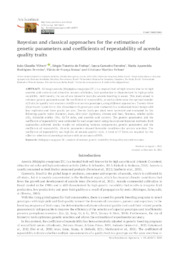Bayesian and classical approaches for the estimation of genetic parameters and coefficients of repeatability of acerola quality traits.
Bayesian and classical approaches for the estimation of genetic parameters and coefficients of repeatability of acerola quality traits.
Author(s): VILVERT, J. C.; FREITAS, S. T. de; FERREIRA, I. C.; FERREIRA, M. A. R.; SOUZA, F. de F.; VELOSO, C. M.
Summary: Although acerola (Malpighia emarginata DC.) is a tropical fruit of high interest due to its high ascorbic acid content and attractive sensory attributes, fruit production is characterized by high genetic variability. Additionally, the use of new biometric tools for acerola breeding is scarce. This study aimed to estimate genetic parameters and the coefficient of repeatability, as well as determine the optimal number of fruits for quality trait analyses in different acerola genotypes, using different approaches. Twenty-three (Experiment I) and thirty-five (Experiment II) genotypes were evaluated in a randomized block design with four replicates and three plants per plot. Twenty fruits per plant were harvested and evaluated for the following quality traits: diameter, mass, skin color (lightness, chroma and hue), firmness, soluble solids (SS), titratable acidity (TA), SS/TA ratio, and ascorbic acid content. The genetic parameters and the coefficient of repeatability were estimated for each experiment using classical and Bayesian methods. Both approaches achieved similar results on estimating variance components, genetic parameters and the coefficient of repeatability. Genetic parameters showed favorable conditions for acerola selection. The coefficient of repeatability was high for all acerola quality traits. A total of 17 fruits are required for the effective selection of acerola genotypes with an accuracy of 95%.
Publication year: 2024
Types of publication: Journal article
Unit: Embrapa Semi-arid Region
Observation
Some of Embrapa's publications are published as ePub files. To read them, use or download one of the following free software options to your computer or mobile device. Android: Google Play Books; IOS: iBooks; Windows and Linux: Calibre.
Access other publications
Access the Agricultural Research Database (BDPA) to consult Embrapa's full library collection and records.
Visit Embrapa Bookstore to purchase books and other publications sold by Embrapa.

